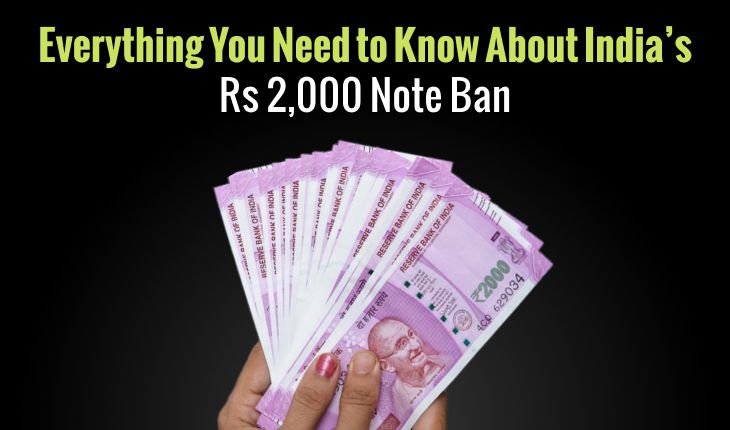Everything You Need to Know About India’s Rs 2,000 Note Ban

Last Updated : May 25, 2023, 11:48 a.m.
The Reserve Bank of India (RBI) made a significant statement lately regarding the distribution of Rs 2,000 notes. It is critical to comprehend the ramifications of this decision. While this is widely referred to as a ‘ban,’ the RBI is really pulling the Rs 2,000 notes from circulation. However, these notes will continue to be a legal currency, which means they may be used for transactions and accepted as payment.
Understanding the Rs 2,000 Note Ban
According to RBI Governor Shaktikanta Das, the decision to remove the Rs 2,000 notes is based on the notion that they have finished their life cycle and accomplished their function. Despite the fact that these notes were created 4-5 years ago, they will continue to be recognized as legal money long after they are taken out of circulation.
Why Is the Rs 2,000 Note Being Withdrawn?
To guarantee a seamless transition, the RBI has initiated a systematic exchange procedure that will last through the end of September 2023. Individuals can swap their Rs 2,000 notes for lesser amounts at separate counters set up by banks.
The Exchange Process of Rs 2,000 Notes
To facilitate a seamless transition, the RBI has established a systematic exchange procedure. The exchange started on May 23, 2023, and will last through the end of September. Deposits of Rs 2,000 notes into bank accounts are not restricted if the existing Know Your Customer ( KYC ) rules and other applicable laws are fulfilled. Non-account holders can also swap Rs 2,000 banknotes at any bank branch up to a maximum of Rs 20,000 at a time. There are no fees associated with depositing or exchanging these notes. Customers with bank accounts who have completed their KYC can deposit an unlimited number of Rs 2,000 notes into their accounts. Special measures are being made to make older folks and those with disabilities as comfortable as possible.
How to Exchange Your Rs 2,000 Notes
Deposits into bank accounts are permitted subject to current Know Your Customer (KYC) rules and other applicable statutory/regulatory regulations. Non-account holders can also swap Rs 2,000 banknotes at any bank branch up to a maximum of Rs 20,000 at a time. Depositing or exchanging Rs 2,000 notes incurs no exchange cost. Bank account holders who have completed their KYC can deposit an unlimited number of Rs 2,000 notes into their accounts. Special measures are being made to make older folks and those with disabilities as comfortable as possible.
The Impact of Rs 2,000 Note Withdrawal
The elimination of the Rs 2,000 notes is a big decision that has sparked several concerns regarding the Indian economy. Despite some early skepticism among bankers, the RBI has published clear recommendations to help with the transition. The RBI anticipates that nearly all Rs 2,000 notes would be returned to the government by September 30, 2023. This approach is anticipated to encourage digital transactions and aid in the management of inflation. However, only time will tell what the full consequences of this choice will be.
Conclusion
The withdrawal of the Rs 2,000 note from circulation is an important event in India’s monetary landscape. Individuals and organisations will need to understand the nuances of this process and its repercussions. As we go through this change, it’s critical to keep educated and follow the RBI’s rules.
Frequently Asked Questions (FAQs)
1. Are the Rs 2,000 notes now illegal?
No, the Rs 2,000 notes are not prohibited. They can still be used for transactions and accepted as payment because they are legal tender.
2. Where can I deposit or exchange Rs 2,000 notes?
Individuals may deposit and/or exchange these banknotes at any commercial bank branch or at any of the RBI’s 19 Regional Offices until September 30, 2023.
3. Is there a limit on the amount for exchange?
Yes, the RBI has imposed a restriction on note exchange. The general public can exchange up to Rs 20,000 in banknotes at a time.
4. Is there a limit on the amount for exchange?
The general public can swap Rs 2,000 banknotes up to a maximum of Rs 20,000 at one time.
5. Where can I file a complaint regarding the deposit or exchange of Rs 2,000 notes?
In the event of a service defect, the complainant should first contact the relevant bank. If the bank does not respond within 30 days of receiving the complaint, or if the complainant is dissatisfied with the bank’s response, the complainant may file a complaint under the Reserve Bank – Integrated Ombudsman Scheme (RB-IOS), 2021 at the RBI’s Complaint Management System portal (cms.rbi.org.in).
6. Are there any special provisions for senior citizens?
Yes, the RBI has directed banks to make preparations to make it easier for older citizens, those with disabilities, and others to exchange/deposit notes.

